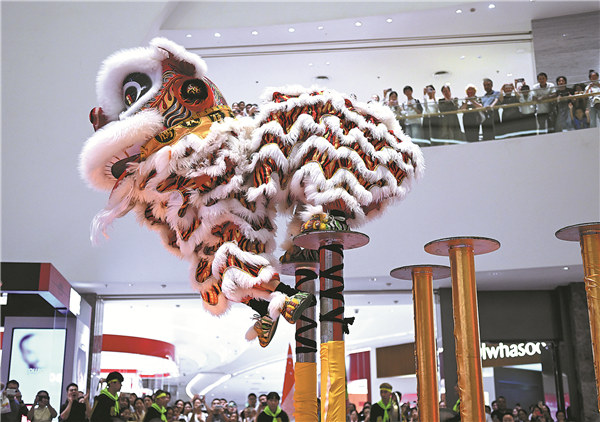

This inclusive philosophy is reflected in the diverse lineup of participants at the 2024 World Chinese King of Lion Dance Championship, which attracted 100 athletes from China, Singapore, Malaysia, Indonesia, Thailand, Australia and Canada, among others.
Unlike Tran, who has Chinese heritage, Syahdatulazmi Bin Bustamam from the Malaysia team discovered his passion for lion dancing two decades ago after attending a performance in his hometown. Captivated by the vibrant display, he fell in love with the art form instantly.
By day, Syahdatulazmi runs a restaurant with his wife but remains committed to practicing as the lion's tail three days a week, dedicating two hours per session.
"I've been doing lion dancing since I was a kid," says the 31-year-old, who is considered "relatively old" in the world of lion dance, through an interpreter. "It's become a hobby for me; I have to do it every day."
Due to adverse weather conditions, the high-pole competition — renowned for its athleticism and acrobatic stunts — was relocated to a shopping mall on the first day of the competition.
Among the audience was 25-year-old Kiki, who was drawn by the sound of gongs and drums. After watching the exciting competition, she says, "I'm happy to see the inheritance of traditional culture. I had only seen performances in China and I didn't realize that different countries each have their own unique features."
The traditional southern lion dance competition, along with dragon dance performances and cultural exchanges related to these ancient traditions, was eventually relocated back to its original venue, the Confucius Temple, a prominent tourist attraction on the banks of the picturesque Qinhuai River in Nanjing.
"A venue like this adds historical and cultural context to the event," says a tourist surnamed Han. "It also provides an authentic cultural experience, making my visit more memorable and enriching. I really enjoy watching the Indonesian team."
Despite not being crowned the "Lion Dance King", Tran was satisfied with his team's performance at their first international competition. "Competing at such a significant landmark in Nanjing, and in China overall, is very special. The architecture and cultural significance are incredibly meaningful to me."
Tran's story touches on the cyclical nature of cultural transmission. As he watched his 2-year-old nephew, who mirrored his introduction to lion dance during childhood, he expressed hope: "It's nice to inspire the younger generation. Hopefully, I'll teach him if he likes it."
During the Qing Dynasty (1644-1911), the time period in Once Upon a Time in China III, the lion dance united communities and asserted cultural identity. Today, it serves as a medium to connect diverse cultures, fostering understanding and respect.
Tran's desire to continue the tradition ensures that the lion dance remains a vibrant, living cultural practice, inspiring future generations as it inspired him, passing on the lion's enduring symbol of power and wisdom.